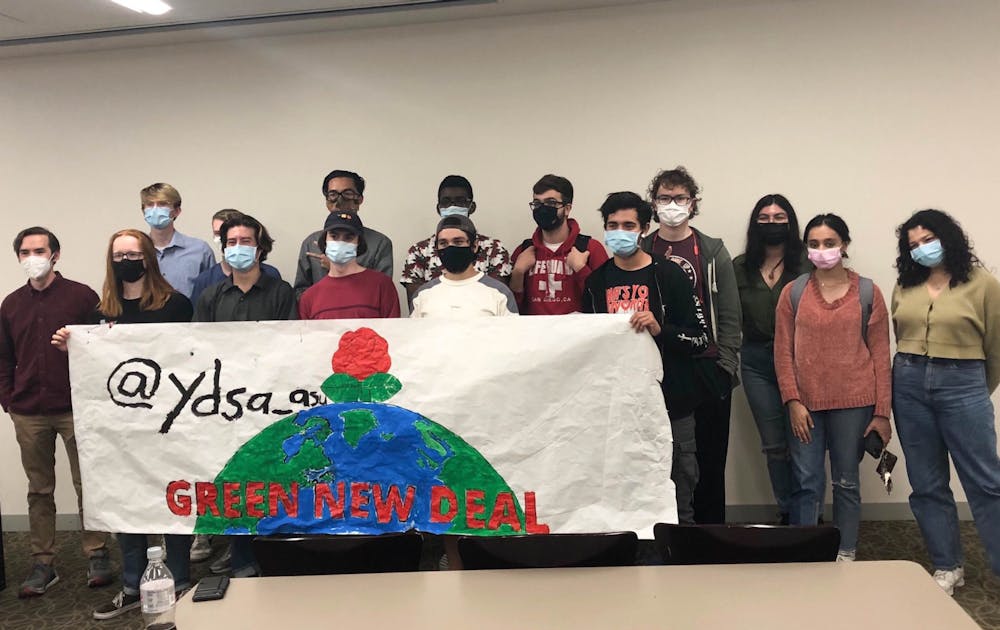During a meeting Wednesday, Young Democratic Socialists of America at ASU announced plans for its Green New Deal divestment campaign, a student-led effort encouraging the University to end its investments in fossil fuel companies and provide more transparent information about them.
The campaign allows students to take direct action in addressing the University's influence on climate change, a phenomena that has contributed to extreme drought and poor air quality in the state, according to the Arizona Republic.
Fossil fuel is an energy source derived from decomposing plants and animals in the earth that is then extracted in the form of things like oil, coal and natural gas.
Jason Knorr, the chair of YDSA and a senior studying political science and global studies, said the campaign is a local version of what its main organization has been doing "on a wider scale."
In a letter that will be sent to ASU President Michael Crow and Gretchen Buhlig, CEO of the ASU Foundation, YDSA will list four main demands. The letter will ask the two University leaders to stop investing in fossil fuel companies, end any current investments and publish transparent information about past and current dealings.
YDSA will also ask the ASU Foundation to "expand the Environmental, Social and Governance Fund and the Sustainable, Responsible Impact Endowment Pool." The ASU Foundation endowments are collections of donations and long-term financial investments for the University.
On top of running sustainability programs, the ASU Foundation said it has been making efforts to reach at least Net Zero greenhouse gas emissions in its endowment portfolio by 2035.
"We have made no new direct private fossil fuel commitments since 2015, and the portfolio currently holds no thermal coal companies directly," the ASU Foundation wrote in its Net Zero statement.
Knorr said projects within the ASU Foundation's "net neutral goal by 2035" have been full of "broken promises" and plans have had very little impact on greenhouse gas levels.
"As the years went by, they realized they weren't going to meet dots, they reduced it, they stopped talking about it," Knorr said in his presentation at the YDSA meeting. "Like a lot of things here at ASU, it's not as good as it looks, and it's mostly for show."
READ MORE: ASU abandoned most of its operational sustainability goals
YDSA said the campaign will spread awareness through tabling, gathering signatures for its petition, organizing demonstrations and networking with a variety of groups within the ASU community.
According to its presentation, YDSA plans to reach out to the Undergraduate Student Government and Graduate and Professional Student Association, as well as student-led organizations, faculty and staff who support the cause.
Isaac Sundin, a junior in biological sciences and justice studies, said it is important for YDSA to get community support in order for the campaign to be successful.
"If we get enough people organized and mobilized around that, then (ASU) won't have an option at a certain point," Sundin said. "Campaigns like this, which have tangible and substantial goals, can be really inspiring."
Michael Simm, an ASU alumnus and local political organizer, attended the launch to show support on behalf of Sunrise Tempe.
"The ASU administration has power over organizations like clubs that could be punished in various ways for not doing what Michael Crow wants," Simm said. "Sunrise Tempe and other large organizations don’t suffer from that fear of repercussions, we can essentially do more active things."
In his 2016 paper, Hendrik Bessembinder, a professor at the W. P. Carey School, said divestment from fossil fuels would cause universities to lose billions of dollars and not have a direct impact on greenhouse gas emissions.
"Perhaps divestment by a given University will spur its students, faculty, staff, and alumni, or the University itself, to reduce consumption of fossil fuel-based energy," Bessembinder wrote in an email. "The tradeoffs that a University faces as it considers whether to divest are of the direct financial costs attributable to divestment versus the potential benefits of the symbolic act."
Despite these concerns, Knorr said he was confident divestment would have an impact and encouraged the University to focus more on the future rather than the financial consequences it could face.
"We know that when we take away the funding and the money that companies are using, that actually gets results," Knorr said in his presentation. "Why are we investing in fossil fuels when climate change is around the corner?"
Reach the reporter at awaiss@asu.edu and follow @WaissAlexis on Twitter.
Like The State Press on Facebook and follow @statepress on Twitter.
Continue supporting student journalism and donate to The State Press today.

Alexis Waiss is an assignment editor and senior reporter, covering breaking news and writing long-form stories. Alexis worked on SP's politics desk for a year, where she reported on the Legislature, higher education policy, student government, the city of Tempe and stories highlighting social justice. She previously worked as a fellow for the Asian American Journalist Association's VOICES program.




